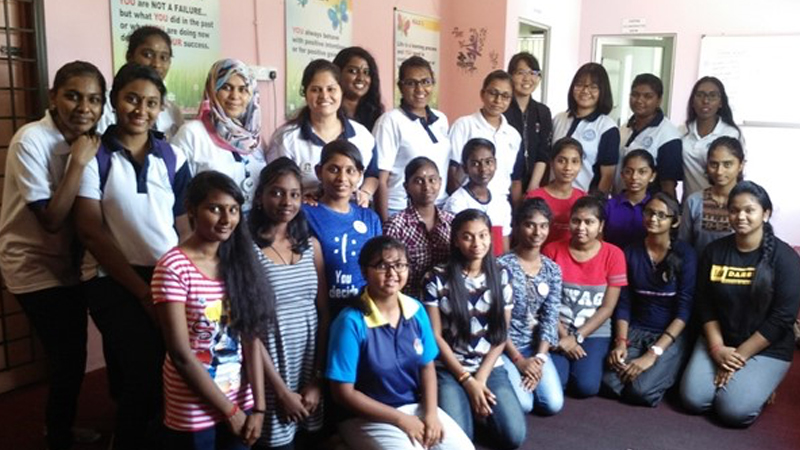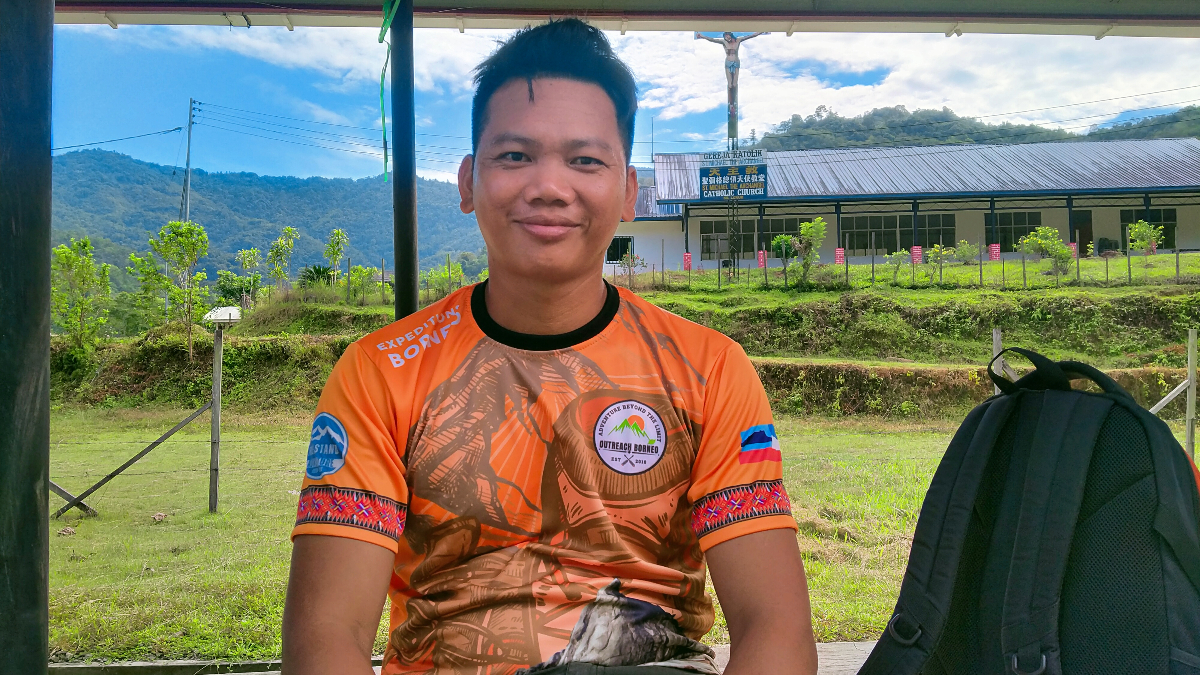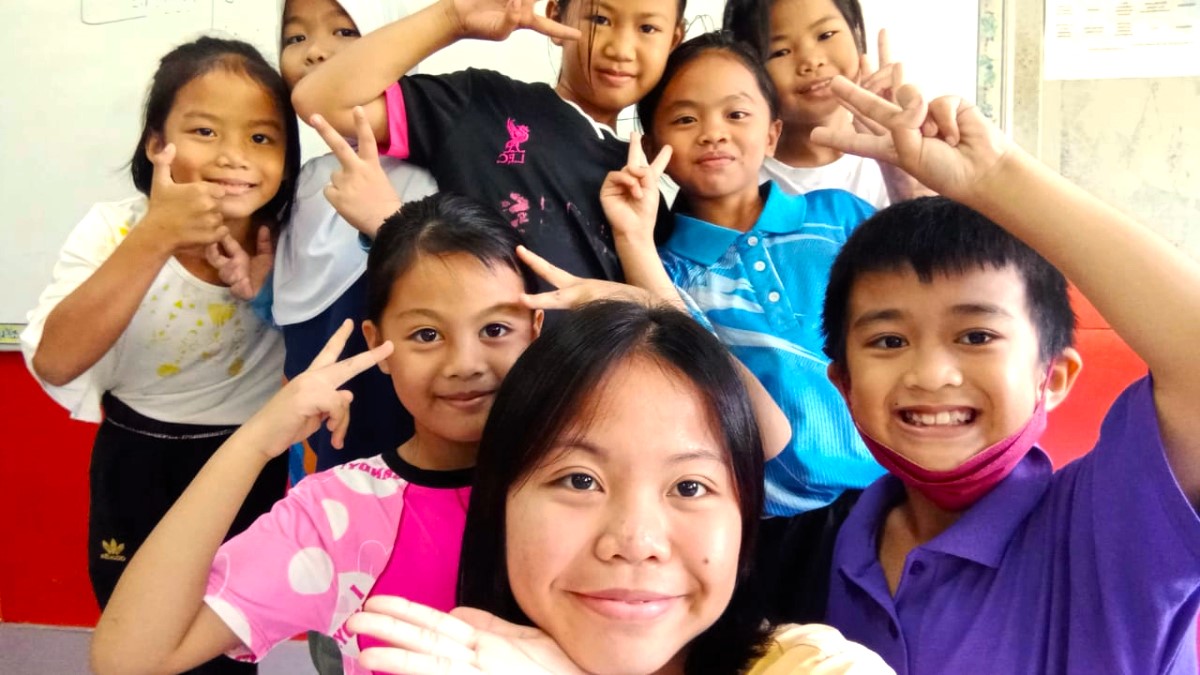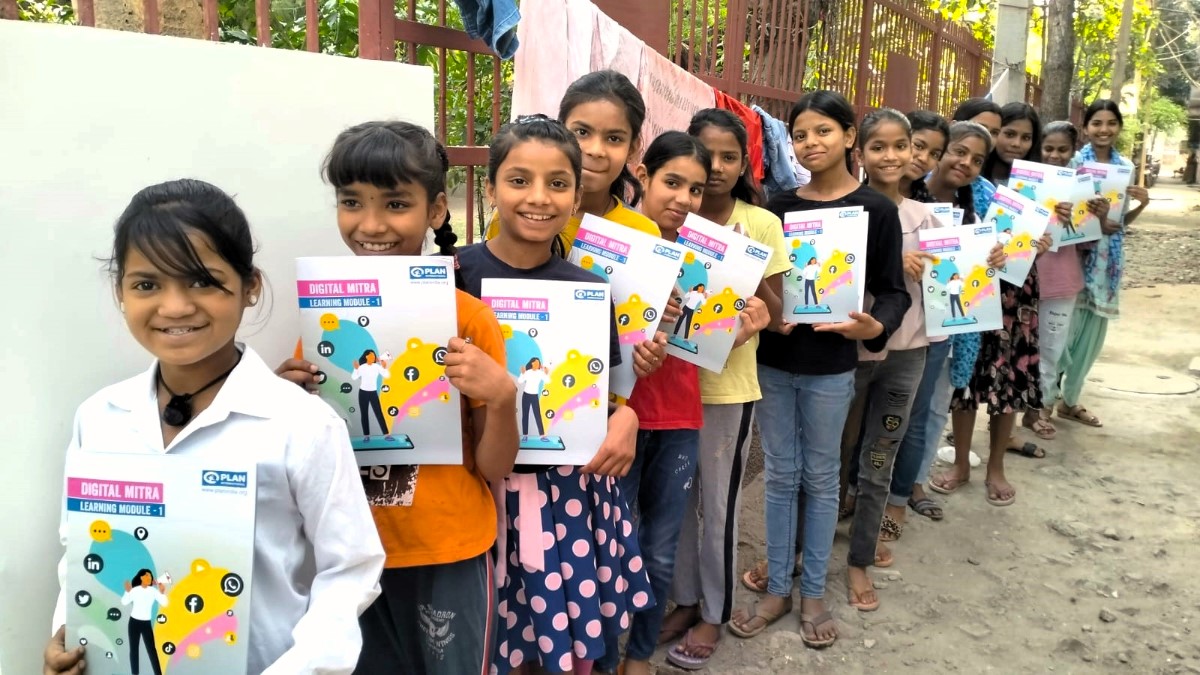“After so many sessions with my mentee, I realised that while she was working on herself, I was working on myself too. Getting involved in the Footprints mentoring programme gave me a sense of identity and calm. I think it helped me heal too… it was like community service for the soul,” Jinesyah shares.Since 2018, the Footprints project has been a collaborative effort between QIU and the Maharani Learning Lab (MLL), another social impact programme spearheaded by RYTHM Foundation. The MLL provides academic support to underprivileged teenage girls and equips them with life skills. With the new alliance, the Footprints project was restructured to empower the adolescent girls with a hope for the future while exposing them to different environments, cultures, knowledge, and education opportunities with the support of a mentor. Jinesyah was one of 14 QIU undergraduates who signed up to be a mentor in the six-month pilot of the revamped Footprints Project back in 2018. This initial group of mentors also included Samantha Dina Dass who was studying for a bachelor’s in special needs education at the time and both girls underwent a stringent selection and vetting process as well as intensive training to ensure they could be positive role models to the adolescents.
 In comparison with Jinesyah, 24-year-old Samantha who is currently a special needs educator had some prior experience volunteering, but in a different environment. She shares, “For me the training was very helpful because this mentoring programme was one-on-one, so I needed to learn how to understand the person and their emotions first rather than immediately launching into action to help like I normally would in group-oriented volunteer activities.”
The training of mentors ensures that they are equipped with the necessary knowledge and skills to engage with and empower the young girls. The intensive two-day sessions cover vital topics like rapport boundaries, emotional intelligence, basic counselling, communication skills, listening skills, problem-solving skills, and other applicable tools. The training also includes a module on setting goals for the future to enable the newly appointed mentors to support their mentees in discovering their direction in life. These skills would certainly come in handy to both Samantha and Jinesyah as they took on their new roles.
In comparison with Jinesyah, 24-year-old Samantha who is currently a special needs educator had some prior experience volunteering, but in a different environment. She shares, “For me the training was very helpful because this mentoring programme was one-on-one, so I needed to learn how to understand the person and their emotions first rather than immediately launching into action to help like I normally would in group-oriented volunteer activities.”
The training of mentors ensures that they are equipped with the necessary knowledge and skills to engage with and empower the young girls. The intensive two-day sessions cover vital topics like rapport boundaries, emotional intelligence, basic counselling, communication skills, listening skills, problem-solving skills, and other applicable tools. The training also includes a module on setting goals for the future to enable the newly appointed mentors to support their mentees in discovering their direction in life. These skills would certainly come in handy to both Samantha and Jinesyah as they took on their new roles.
The training provided Samantha with the skills necessary to get through to her reserved 16-year-old mentee who had her guards firmly up. She explains, “She was incredibly quiet, and it was difficult to convince her to open up during the first few sessions. I would try asking more open-ended questions, but her answers would be singular, one-word answers. Thankfully, the training helped me to understand that not everyone expresses their feelings with words and that it is okay if someone is not expressing emotions the way we want them to.”Samantha continued to apply the tools she learned from the training of mentors and eventually the barriers broke down and her mentee opened up about her love of science and animals. Samantha then launched into action by providing her mentee with a list of careers that were a blend of both her interests to research online.
“I slowly built trust with her by talking and getting her excited about figuring out her interests for her future. The last I heard, she’s pursuing her tertiary education in a teaching course right now,” says Samantha.
 Jinesyah also faced similar challenges but thanks to the communication skills and active listening skills she picked up from the training of mentors, Jinesyah was able to bond with her mentee. She discovered that her mentee had been bullied, which Jinesyah knew a thing or two about too.
So, she began sharing her own experiences to relate to her mentee and show her that it was possible to overcome painful experiences. Jinesyah’s mentee went from having no confidence or ambitions beyond sitting for SPM examinations at first, to deciding she wanted to be a teacher by the end of the programme.
Jinesyah also faced similar challenges but thanks to the communication skills and active listening skills she picked up from the training of mentors, Jinesyah was able to bond with her mentee. She discovered that her mentee had been bullied, which Jinesyah knew a thing or two about too.
So, she began sharing her own experiences to relate to her mentee and show her that it was possible to overcome painful experiences. Jinesyah’s mentee went from having no confidence or ambitions beyond sitting for SPM examinations at first, to deciding she wanted to be a teacher by the end of the programme.
“I really wanted to help her because I was bullied too and remember what it felt like to have no one to stand up for me. I could not stand up for her, but I could help give her motivation to build her confidence and bring out the best version of herself. She worked hard on herself, and I was so proud of her,” Jinesyah shares.While the main goal of the Footprints project has been to empower mentees in the hope of eventually breaking the cycle of poverty in their communities, it appears that they aren’t the only ones who stand to benefit from the Footprints project.
“I used to be very sensitive and took things too seriously. But when I joined the Footprints Project, I started looking at my problems as challenges instead. It motivated me to work harder in my studies so that someday I can be in a better position to do more for society,” says Jinesyah.Taking on the role of a mentor gave her a sense of identity and a more positive outlook on life. Jinesyah even saw improvement in her academic results and a raised GPA by the time she graduated, which she attributes to her mindset change brought about by the Footprints Project.
Samantha also shares, “A mentor needs to have a lot of skills to model ourselves in a positive way because the mentees look up to us. So, we are actually building ourselves up too – our strengths and emotions. Being able to help and make a difference to our mentees also validates our strengths, just like it did for me.”The pilot Footprints project in 2018 proved to be such a roaring success with positive outcomes for both the mentors and mentees, that moving forward, the project will run for a whole year instead of six months. The mentorship programme will also be executed with a more structured format and topics to create more impactful outcomes for the mentors and mentees. RYTHM Foundation was all set to kickstart the latest intake of the mentorship programme at the end of June this year, however the COVID19 pandemic and the extension of the Movement Control Order (MCO) threw a spanner in their plans. Despite this, the foundation is optimistic in the face of the pandemic and has recently completed a virtual training of 20 new mentors from QIU to keep the programme going. The training was conducted via Google Meets by 14 QIU lecturers who covered a range of topics.
 The foundation has also set up a contingency plan to adapt the mentorship programme to a virtual platform if the MCO is extended once more as students have already been selected to be enrolled into the programme. QIU intends to incorporate Footprints as a core programme in its curriculum and plans to pitch the mentoring programme to other universities to follow suit and create more opportunities for young adults to find fulfilment, just as Jinesyah and Samantha did.
The foundation has also set up a contingency plan to adapt the mentorship programme to a virtual platform if the MCO is extended once more as students have already been selected to be enrolled into the programme. QIU intends to incorporate Footprints as a core programme in its curriculum and plans to pitch the mentoring programme to other universities to follow suit and create more opportunities for young adults to find fulfilment, just as Jinesyah and Samantha did.





